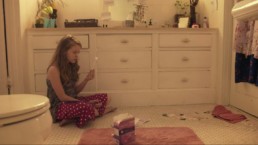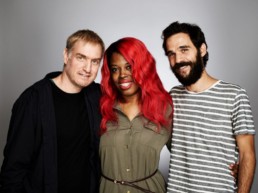'Girl Flu' is An Unabashedly Bold Look at Entering Womanhood
Having recently relocated from the valley to Echo Park, 6th grader Robin (Jade Pettyjohn), who also goes by the name "Bird," is very mature for her age as evident by the daily positive, handwritten affirmations flooding the walls of her room. Immediately, we see that she is way more responsible than her 30-year-old mother Jenny (Katee Sackhoff) who smokes pot in her daughter's presence, sleeps until noon, complains that she hates grocery shopping, and for no apparent reason at all, has Bird take a city bus to a school event while she literally eats breakfast in bed. Jenny's "free spirit" is like that of Gillian Jacobs' character, Mickey in Judd Apatow's TV show "LOVE," and her hipster-ness can be so over the top that at times, it is hard to relate to her.
It is during this school event when, what seems to be every girl's worst nightmare, comes true. Bird gets her first period– wearing white pants no less. What happens next, and for the remainder of the film, is cringe worthy, lingering awkwardness between the characters, the situation, and the film in general. Jenny laughs at her daughter and embarrasses her despite pleas to stop. Mom and daughter even attend a ritual to celebrate her first period, complete with flower crowns and glitter paint. While there are some moments of authenticity, mostly coming from Bird, one can only hear the phrase "blood gushing out of me" so many times.
Unfortunately, that is all this film offers- a girl gets her period and her mother doesn't know how to be a mother when she is most needed. The attempt Jenny makes to treat her daughter like a best friend comes off as extremely selfish, going so far as saying that Bird is ruining her life. Jenny does eventually semi-confront her carelessness but by this point, it's too little too late. She has dug a hole so deep that it's asking a lot of the audience to accept the apology and find any redeeming qualities in her.
We leave "Girl Flu" wondering what more the story could have been. Pettyjohn gives a good performance as a strong, independent young woman and it is with her where our trust in the film lies. Luckily, she delivers. Jenny's love interest Arlo (Jeremy Sisto) is another voice of reason that we hold onto to guide us through the chaos of female puberty. However, the script lacks the necessary elements to make "Girl Flu" an emotionally compelling story, therefore falling into our list of easily forgotten festival films.
In 'King Jack,' a Sensitive Misfit Comes of Age
Charlie Plummer is fantastic in his first major role as the titular Jack. His portrayal of a kid with a youthful innocence while simultaneously trying to be the tough guy is commendable. Despite his I-don't-care attitude, we see through that tough outer shell to a sweet interior, and this makes him extremely likeable. The supporting actors, including Yainis Ynoa and Cory Nichols who all give great, natural performances as well, make this narrative feel more like a documentary in the best way possible.
Thompson paints the small, lower class town with a bluish hue- giving it a muggy feeling. The cinematography alone elicits sensations of groggy days and mosquito-infested nights. It's the type of town where kids throw rocks for fun, smoke and drink before noon, and pick fights basically because there is nothing better to do. Displaying such a strong sense of the surroundings practically makes this unnamed town a character of its own.
"King Jack" won the Audience Award at the 2015 Tribeca Film Festival and it's not hard to see why. Jack is the type of hero we like and root for, his pure heart and sensitive soul make him a strong lead. The story is not groundbreaking and, certainly, this type of cliché, coming-of-age film has been told before and will be again, but this one makes for a great addition to the genre. Ultimately, this is a story about friendship and realizing that the best way to navigate through life is to value your connection with others.
"King Jack" is not rated. Opens in theaters at Laemmle's Music Hall 3 and on demand Friday, 6/10.
Loneliness Explored in L.A. Set 'No Light and No Land Anywhere'
Writer/Director Amber Sealey's third feature film "No Light and No Land Anywhere" is a poignant story of one woman's search for the truth while simultaneously trying not to lose herself in the process. Fresh off of a breakup, London native Lexi (Gemma Brockis) risks what little she has left to travel halfway across the world in hopes of finding her estranged father. Once she lands in Los Angeles, with a carefully curated suitcase of clothing in tow, our protagonist is immediately thrust into less than ideal circumstances, putting the city's underbelly of casual sexual hookups, revelations, and its realistic, less-than-glamorous image at the forefront.
Gemma Brockis has an indescribable, enchanting quality that makes Lexi's struggle one we can't turn away from. Her quirkiness is celebrated here, where emotion is not just portrayed through dialogue, but expressed through a version of performance art as well. In an abstract way, Gemma gives Lexi another outlet in which to channel her feelings of loneliness, longing, and love.
Amber Sealey solidifies herself as a director to watch, and not just because she is a woman (that's just the icing on top). Her ability to transcend cliché expectations of her characters and find a little light in otherwise dark situations is a refreshing take on the female-centric genre of "finding oneself." Her protagonists are confident women who do not apologize for being themselves, rather they go to show that one's self is enough.
For foreigners and natives alike, Los Angeles can feel like a lonely place. Despite its large population, endless amounts of distractions, and the everyday hustle and bustle of city life, one can feel so very alone. This is especially felt by Lexi as she searches for the missing link in her family tree. The vibrancy of the city is fully felt through the cinematography (shout out to cinematographer Catherine Goldschmidt); the foggy mornings and seedy free newspapers are captured through handheld camerawork and really make the viewer feels as if we are there. The film's all around authenticity, coupled with incredible performances and execution, makes "No Light and No Land Anywhere" feel both intimate and fearless.
"No Light and No Land Anywhere" is executive produced by indie film heavyweight Miranda July, and premiered at the LA Film Festival on Friday, June 3rd. A second screening on Jun 8 at 6:25 PM has been added by popular demand. Buy tickets here.
'As I Am' is a Touching Tribute to Mix Master DJ AM
I remember the moment like it was yesterday. I was in college when news broke that Blink-182 drummer Travis Barker and mix master DJ AM were involved in a deadly plane crash. Fortunately, they were going to survive, despite a long road to recovery ahead. However, four others, including the captain, died with the plane's harsh descent and fiery blaze. Despite the tragedy, fans rejoiced at the news that their heroes were safe. For DJ AM, however, the PTSD of surviving the crash, along with past issues stemming from a turbulent childhood and history of addiction, re-ignited that battle, which was ultimately lost. All of this and more is captured in the new documentary "As I AM: The Life and Time$ of DJ AM."
DJ AM, AKA Adam Goldstein, touched a lot of people in his short 36 years of life, both personally and through his music–so for a lot of his fans, this documentary was a long time coming. Director Kevin Kerslake, a successful music video and commercial director, purposefully paints Adam in a vulnerable light to show that despite his fame and fortune, he is just as relatable and human, and as susceptible to pain and insecurity, as are we. It is this ability to connect with him, to feel like we get to know the real Adam Goldstein in this short 110 minutes, that makes this film so hard to watch and yet so powerful.
The minute the film starts, it jolts you into that September day back in 2008. Police dash-cam footage of the plane crash plays to a woman's voice-over, presumably his mother, fondly remembering Adam's childhood love of music and arcade games.Friends and other notable electronic music artists, including DJ Jason Bentley of KCRW's 'Morning Becomes Eclectic,' DJ A-Trak, Steve Aoki, and more, guide the film with their anecdotes about Adam as a child, a rebellious teenager, and a paparazzi jackpot.
Quoted by many as "the best DJ in the world," "the Tony Hawk of DJing," and "the Bad One," the film takes the viewer on a journey through some of his darkest days. Having been sent to a corrupt rehabilitation program as a teenager due to drug addiction, Adam was subject to cruel and unusual punishment that ultimately shut the institution down. To further throw the young man's life into a spiral, while in rehab, his mother shocked him with news that his childhood father isn't his biological father. Through all of this, Adam found solace and relief in music. His work ethic and constant practice behind the turntables saw his fame increase until eventually he was earning $2 million contracts to perform in such destinations as Las Vegas nightclubs. Sadly, despite over 10 years of subsequent sobriety, DJ AM eventually relapsed due the pressures of his lifestyle and from his trauma-inducing plane crash. Personal friends, including Seth 'Shifty Shellshock' Binzer, are moved to tears when recalling his pure heart and spirit, reminiscing on his outwardly positive "can-do" attitude.
Being both one of electronic music's most popular artists as well as a regular guy with a troubled past, DJ AM was a juxtaposition of himself. Adam Goldstein's story is one of both tragedy and heartbreak while simultaneously being inspirational and fulfilled. Ultimately, though, his life's story serves to teach those to always work hard and in the direction of your goals–an inspiring message that reaches far from beyond just the turntables.
"As I AM: The Life and Time$ of DJ AM" is not rated. Showing for one week at the ArcLight Hollywood on Friday, 6/3, and available digitally via FilmBuff on all platforms 6/14.
THE 7 BEST THINGS HAPPENING AT LAFF 2016
Commence the countdown, we're only one day away from the 2016 LA Film Festival! In anticipation, we've made a list of the seven best things happening at this year's fest. Courtesy of Edric Silla for ArcLight Cinemas
Courtesy of Edric Silla for ArcLight Cinemas
1. New Year, New Venue
So long Downtown, and hello Culver City! This year, the LA Film Festival takes place in the Westside's newly-built ArcLight Theatre, the eighth location for the Los Angeles-based company. The best part? $2 parking!
 Kirby Dick in Sundance. Courtesy of Araya Diaz/WireImage
Kirby Dick in Sundance. Courtesy of Araya Diaz/WireImage
2. Coffee Talks: Documentarians
These talks are always a highlight for us, and this year we'll sip a flat white among some of our favorite documentary directors, including Kirby Dick (The Hunting Ground, The Invisible War) and Lucy Walker (The Crash Reel, Waste Land).

Ryan Coogler and Ludwig Göransson. Courtesy of Black Film
3. Ryan Coogler: Crafting the Sounds and Score of Creed
On Saturday, June 4th, LA Film Festival Guest Director Ryan Coogler will present clips from Creed and Fruitvale Station (a LA Film Fest alum) and talk with composer Ludwig Göransson and sound designer Steve Boeddeker about how the perfect soundscape can be achieved, no matter if it’s at the studio or the indie level.
 Courtesy of Cambio
Courtesy of Cambio
4. The After Party
After a full day of watching films, what better way to unwind than with a drink under the stars? The LA Film Fest after parties are always a great way to meet filmmakers and cinephiles alike, and with this year's venue change, I'm anticipating them more than ever.
 Emily Robinson. Courtesy of Rogers and Cowen
Emily Robinson. Courtesy of Rogers and Cowen
5. Transparent Actress, Emily Robinson's directorial debut
At just seventeen-year-old, Robinson is already making a name for herself in Hollywood. She stole the screen in the Amazon award-winning series Transparent, and now Robinson is taking a turn in the director's seat. Her self-funded short film Virgin Territory, which she wrote, directed, produced and stars in, will have its world premiere on Thursday, June 2nd.
 Topher Grace in 'Opening Night'. Courtesy of Film Independent
Topher Grace in 'Opening Night'. Courtesy of Film Independent
6. Opening Night
Director Isaac Rentz is a friend of ours, and we can't wait to see his feature film debut Opening Night hit the big screen on Friday, June 3rd. Starring Topher Grace and Lauren Lapkus, this comedy/musical is centered around a failed Broadway singer, working as a production manager, who must save the opening night of his new production by wrangling his eccentric cast and crew.
 Gael García Bernal in 'Desierto'. Courtesy of Cinefila
Gael García Bernal in 'Desierto'. Courtesy of Cinefila
7. The Closing Night Film: Desierto
From Jonás Cuarón and his dad Alfonso Cuarón, the acclaimed filmmakers of Gravity, comes a unique, modern vision of terror. Desierto is a visceral, heart-pounding suspense-thriller packed with tension from start to finish, starring Gael García Bernal (Mozart In the Jungle, The Motorcycle Diaries, and Y Tu Mamá También) and Jeffrey Dean Morgan (Watchmen). With music accompanied by Woodkid, this is sure to be the perfect way to end an awesome week.
To follow our LAFF adventures in real time, be sure to follow us on twitter (@cinemacyspeaks) and instagram (@cinemacy)!
Princess Shaw and Kutiman Talk Humble Beginnings in 'Presenting Princess Shaw' [LISTEN]
[soundcloud url="https://api.soundcloud.com/tracks/266081013" params="color=ff5500&auto_play=false&hide_related=false&show_comments=true&show_user=true&show_reposts=false" width="100%" height="166" iframe="true" /]
When I met Princess Shaw before our interview, it was like reuniting with a long lost friend– only we've never met before and what I do know of her, I've learned through the documentary "Presenting Princess Shaw." "Hello darling," she says enthusiastically as she pulls me in for a giant hug. Not only is she the sweetest interviewee of recent memory, she is genuinely excited and humbled to be talking about the film, a story all aspiring artists can look up to. I also had the opportunity to chat with Kutiman, the musical genius who discovered her, and we talk about growing up with music in their veins, the secret to making a good song, and her reaction to seeing her face on the poster for the first time. We begin:
After I saw the film, I kept humming the songs from the film out loud, it really stuck with me.
Princess Shaw: Haha!
To you, what makes a good song?
PS: I think the lyrics, if you're really saying something, and if you have a really catchy hook– but you already know that! Most of the songs that stick with me stick with other people, and that's how I know it's a good song. But if you have deep lyrics and emotion in your voice, that makes a great song.
Kutiman: I just feel something, whatever excites me, I don't know how to explain it. Sometimes it's the melody, sometimes it's the groove, sometimes it's the lyrics.
What was life like growing up, were you always musically inclined?
K: I fell in love when I was six-years-old and I would hear my neighbor playing the piano. I grew up in a small village in the North of Isreal and I didn't know anything about music.
PS: My sister and I would write plays and sing in the choir. I would do dances and write songs, but I wasn't confident. It was a way for me to escape out of my jacked up childhood, to go somewhere else and someplace else. I had this great imagination that I would be in front of people and they'd just watch me dance and sing. It took me awhile to get that confidence, though, but I'm here now!
"It was a way for me to escape out of my jacked up childhood, to go somewhere else and someplace else."
When you saw Samantha on YouTube, did you know right away that she was someone special?
K: Yes! I had the instrumental track already and I was searching for vocals for it, and she was perfect for it. It was magical to find her... We're having a great time together [throughout this process], and I'm so thankful for that because it could have been anyone. I love spending time with her.
How did you get attached to this film?
PS: His [director Ido Haas] wife contacted me on Facebook and said he was doing a documentary on YouTubers and if I'd like to be involved. When I was first asked, I was a little weary. When I met him, there was instantly a calm about him and a sweetness, a realness and openness about him that I felt like I could be open and bear my soul. I was honored that he came all the way from Isreal to New Orleans, I was crying because, at that point, I felt like I was nobody. For someone to think I was that much of a "somebody" was an honor. So I said if I'm going to do this, I'm gonna do it all the way. From that point, we went to an open mic night [in New Orleans] and he kept following me around. Dope sauce.
Kutiman, how does it make you feel knowing that you impacted her life so much?
K: Wow, yeah it's really amazing. When I'm working on these projects I think about these [musicians] because I see them for hours and hours. Sometimes I just see a small part of their room and I think about who they are and what they do. To eventually meet one of them and see what it has done to her life is priceless.
"For someone to think I was that much of a 'somebody' was an honor."
How did you get into making these videos in the first place?
K: I was unemployed and spent a lot of time on YouTube, I saw a lot of videos and piano, guitar, and drum tutorials to improve my own playing. I had a lot of the videos open in different tabs and I thought, 'hmm I this could work.'
What was it like seeing your face on the poster for the first time?
PS: I had no idea the documentary had taken another turn [just following me] and so when I went to Isreal, I walked into Ido's house. I turned around and saw the poster and said, "What the 'bleep'?!" It was just my face. I was like are you serious? Ido held that [secret] in for a long time, I knew that was killing him, haha. I just couldn't believe it, it was my face up there. My name's in there.
Are you going to take a poster and hang it in your house?
PS: When I went to the Baton Rouge Film Festival in Lousiana, they had this huge banner hanging over the balcony of my face. They sent that to me. I can't put it anywhere, it's so big!
I heard there is a full-length album in the works!
K: When Samantha was in Isreal, I knew that I wanted to do more music with her, and not the YouTube way. We recorded a lot of songs in a studio and now I'm working on the music.
"I feel like there is so much fakeness out there and I think this film is about hope and being real."
What was the film festival experience like?
K: It was amazing! I play in bands and when you perform, you have to go on stage and people [judge you] and you have to work hard to get their love. Here they just play the film and after everyone clapped, like "Yay we love you." Haha. It's like going just to the encore [of my band's performance]. Now, every time I go into a cinema and I hear the audience clapping, I feel like they're falling in love with Samantha through the film. It's unforgettable.
PS: Seeing myself on film is crazy. I was like, "I'm fat! Hold your stomach in! Look at your hair!" I was sitting in the theater thinking they hate it. But then they started clapping. Then I saw there was a line of people waiting to talk to me, I was like wow. I remember this one lady who is a survivor of childhood abuse, but she's struggling, and she was hugging me and crying. She thanked me, saying I gave her courage to tell her story. I'll always remember that lady.
If people could take away one thing after watching "Presenting Princess Shaw," what would you want that to be?
K: Something about being real, honest and open. I feel like there is so much fakeness out there and I think this film is about hope and being real.
PS: I want you to go away feeling good about life, and realize you can make it through. Sometimes you don't get to live that fabulous life, but you should be ok in your life and be successful in everything you do. It doesn't have to be in front of a crowd of people– be successful with whatever you do in life. You don't have to be famous to be successful, success is here (points to her heart).
For our review of "Presenting Princess Shaw," click here.
Former Cult Member Recalls Life as a Brainwashed 'Disciple' in 'Holy Hell'
Movies about cults and the mysteries behind religious organizations usually always make for a fascinating watch. Take Alex Gibney's Emmy-Winning documentary "Going Clear: Scientology and the Prison of Belief," which provided an in-depth look at the infamous Tom Cruise-beloved organization. A handful of films currently streaming on demand also shed light on various cults, including the L.A.-bred "The Source Family," the evangelical "Jesus Camp" and "Kidnapped for Christ." With a plethora of this type of films already available for viewing, what makes director Will Allen's documentary "Holy Hell" unique is that for 22 years, he was a member of the Buddhafield Cult, the same cult he is now exposing.
Executive produced by Jared Leto, "Holy Hell" shows how one man's search for the truth unexpectedly lead him down a dark path of brainwashing, sexual abuse, and all around mental torture. Allen, who also narrates the film, explains his how he was introduced to "The Buddhafield" by his sister Amy in the mid-eighties. He recalls meeting The Teacher, a flamboyant man named Michel, who was the leader of the organization. Taking a liking to Allen quickly, Michel designates him as the group's filmmaker. That footage is what makes up most of this documentary, and it is as chilling and the process as stereotypical as one might expect.
The first act of the film shows beautiful hippie types, barely dressed and frolicking through the forest, hallucinating on happiness. However, the red flags surrounding The Teacher becomes more the forefront of the film as we discover that this organization, which sets out to achieve growth and "The Knowing" (the ability to meet God), is really evolving into mental manipulation to feed Michel's narcissistic, maniacal ego.
"Holy Hell" takes twists and turns that are hard to digest, and this is only further supported by the endless amount of archival footage from Allen's camera. At times, it is heartbreaking; forced abortions, severing ties with loved ones, and the rampant occurrence of sexual abuse continues to evoke an emotional response from those who recount those experiences. One male member, in particular, describes being sexually abused by Michel every Monday for five years. It takes around two decades, but eventually enough of the pieces fall into place allowing some members to see the Buddhafield for what it truly is: a cult. It took Will Allen 22 years to figure this out before he finally left the group in 2007.
"Holy Hell," which premiered at this year's Sundance Film Festival, is a creepy but fascinating watch and a good addition to the ever-growing genre of "religious cult" films. The film so accurately portrays Allen's memory of the Buddhafield because he was literally the one shooting the footage during those years.The film captures Allen’s 180-degree shift in attitude from finding the truth to exposing a monster, condensing 22 years into a 100-minute runtime. While the ending of the film seems a bit silly– "Snow Patrol" by Chasing Cars plays to a music video of "disciples" aka group members in white shirts and pants dancing in a meadow– the parting words are enough to make us do a double take: "You've got a cult in your town, I almost guarantee it." Consider us warned.
"Holy Hell" is not rated. Opens in theaters on Friday, 5/27.
'Presenting Princess Shaw' is a Cinderella Story for the Millennial Generation
Every day, countless people post pictures on Instagram or videos on YouTube in hopes of their big break. That modeling contract or singing career is a dream for so many and just a short time ago, Princess Shaw was among the millions hopeless romantics, posting videos on her YouTube channel. Though she was among the crowd, Princess is different. Not only is her talent unmatched, her energy and natural charisma caught the eye of just the right person who not only helped her achieve her musical goals but also gave her the confidence to believe in herself. Filmmaker, Ido Haar's documentary, "Presenting Princess Shaw," is an inspiring portrait of a girl who deserves the world’s recognition, and with hard work and a bit of luck, is able to see her dreams come true.
The man who discovered Princess's untapped talent is Israeli artist Ophir Kutiel, who goes by the pseudonym Kutiman, and the film opens with him. Kutiman is a man of few words, but a gifted musician, creating virtual symphonies solely through user-generated YouTube videos. As he was looking for vocals to lay on top of an instrumental track he was working on, he finds Princess's YouTube channel, flooded with tons of original songs she wrote and performed, and devotes his time to watching every last one. Kutiman decides to use one of her songs, "Give It Up," and surprise Princess by uploading the finished piece to YouTube without telling her, leaving it to her fans and friends to share the big news.
Meanwhile, in a lower class neighborhood of New Orleans and unaware of any such surprise, "Princess Shaw" aka Samantha Montgomery, 38, is struggling to make ends meet. Working as a nurse, she barely can afford rent, let alone car payments when her car breaks down and tires get stolen, leaving her with little mobility. Still, her positivity and radiance continue to shine through her vocals, which she exudes at any chance she gets. From singing with strangers on the street to the elderly in the hospital, Princess Shaw is the epitome of a ray of sunshine. However, her songs are not always so cheery. A survivor of sexual abuse, Princess's songs run deep with emotional lyrics and raw emotion. Her life's story has been a turbulent one, and so we are happily rooting for her when we see her dreams coming true before our eyes.
Ido Haar's unique construction of this documentary brings two people from opposite sides of the world together to create beautiful music. It is a heartwarming testament to the age-old saying that the universal language is music, which as a whole, is inspiring. There are a few aspects of the film that seemed to drag a bit, at times it feels as if we are exclusively scrolling through Princess's YouTube feed as opposed to watching the film. The film also cuts back and forth from Louisiana to Israel frequently, and I felt like the scenes with Kutiman at home seemed overly staged, forcibly taking me out of the naturalistic, documentary setting.
A lot of stars had to align in order to make this documentary, let alone make it successful. First, finding the talent, the needle in the haystack of countless YouTube hopefuls dying for their big break. Plus, keeping the big reveal a secret to Princess until literally the moment she discovered the video online. Also, the reception of the song, "Give It Up," was not immune to criticism, so there was no way of knowing just how well the song would be accepted. Then there is the personality of the star, Princess, and how she would translate on camera. Director Ido Haar took a risk by counting on all of these components to work out, and his risk paid off in insurmountable ways. Director Ido Haar took a risk by relying on all of these components to work out, and his risk paid off in insurmountable ways. Not only has he created an inspiring story of hope and perseverance, he has essentially re-made the Cinderella story for the millennial generation.
"Presenting Princess Shaw" is not rated. Opens in theaters, on iTunes, Amazon video, and VOD on Friday, 5/27.











